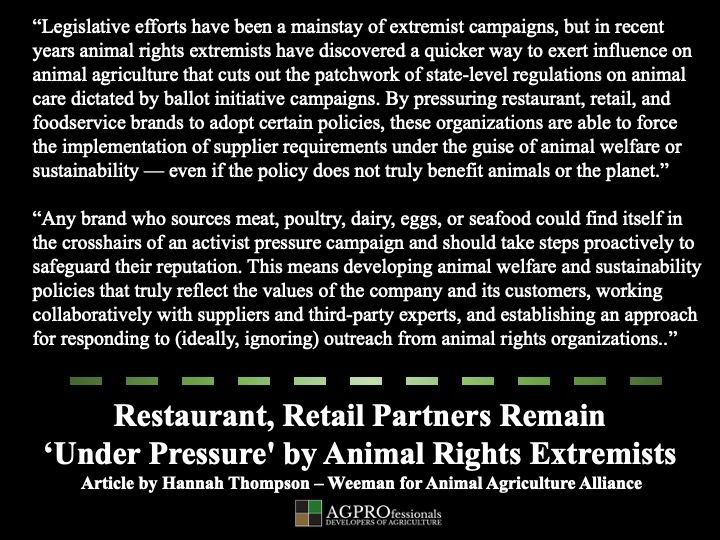Article first published on March 8, 2024
Any company involved in the production, processing, and retailing of dairy, meat, poultry, eggs, and seafood has at least one thing in common — the potential to be targeted by animal rights extremist organizations. These groups are opposed to people using animals for any purpose, including for food. Among the many tactics used to advance their goal of eliminating animal agriculture and taking animal products off of our plates, one is of primary concern to any consumer-facing food brand (and those that supply them) — pressure campaigns and pushing for “incremental changes” which they claim are in the name of animal welfare or sustainability.
Legislative efforts have been a mainstay of extremist campaigns, but in recent years animal rights extremists have discovered a quicker way to exert influence on animal agriculture that cuts out the patchwork of state-level regulations on animal care dictated by ballot initiative campaigns. By pressuring restaurant, retail, and foodservice brands to adopt certain policies, these organizations are able to force the implementation of supplier requirements under the guise of animal welfare or sustainability — even if the policy does not truly benefit animals or the planet.
The underlying motive of their requested changes or demands, which are almost always very costly for farmers to implement, is to make food production less efficient and increase food costs, forcing consumers to make tough choices about what they can afford. Tactics employed in pressure campaigns include social media posts, “silent protests” outside of stores, delivering petitions to corporate headquarters, and even purchasing website domain names of company employees and board members in an attempt to tarnish their personal reputations.
Major trends in pressure campaigns in 2023 included a focus on “enforcement” (in quotes because activist groups do not truly have authority to enforce anything) of previous commitments on sow and laying hen housing, and a push for additional companies to adopt broiler welfare policies in line with the so-called “Better Chicken Commitment” (again in quotes, as “better” doesn’t really seem to be science-based, feasible or sustainable). We also saw a shift recently to activist groups coming out and incentivizing shifts to plant-based offerings in their scorecard reports, which pit brands against one another based on their public policies. This makes the true intentions of these groups quite clear, and should discourage brands who are interested in keeping all options on the menu from considering engagement.
Any brand who sources meat, poultry, dairy, eggs, or seafood could find itself in the crosshairs of an activist pressure campaign, and should take steps proactively to safeguard their reputation. This means developing animal welfare and sustainability policies that truly reflect the values of the company and its customers, working collaboratively with suppliers and third-party experts, and establishing an approach for responding to (ideally, ignoring) outreach from animal rights organizations.
Companies further up in the supply chain should take the opportunity to be a resource to restaurant, retail and foodservice customers. We’re all in this together.

